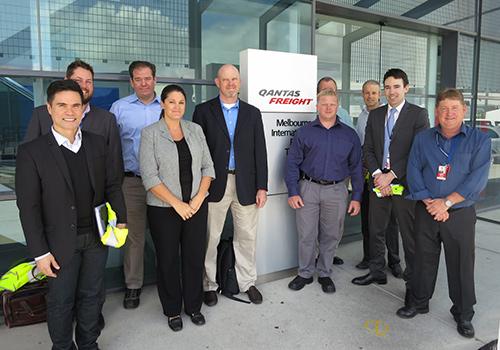TSA Position Takes Clifford ’07 Around The World

By RAVEN ECKMAN ’16
Each year, millions of tons of cargo are shipped through airports in the United States. Stacked crates dominate warehouses, awaiting clearance to their next destination. Uniformed workers move through a maze of crates, scurrying around as trucks and forklifts move tons of cargo at a time.
Before it can be shipped, the cargo needs to pass extensive security measures. Airport personnel work diligently with transport security specialists to ensure the cargo meets all security requirements.
“There is always an element of danger when working in an active airport environment,” said Timothy Clifford ’07, an inspector in the Transportation Security Administration (TSA) Office of Global Strategies.
Raised in the Greater Philadelphia area, Clifford started at TSA as a part-time transportation security officer at Philadelphia International Airport shortly after earning a B.A. in Criminal Justice and a minor in forensic psychology at Arcadia University.
Now in his seventh year with TSA, Clifford credits the encouragement of a former supervisor and a former manager, who each suggested he apply to their offices, to helping him land jobs as program analyst and inspector.
His experience in the different fields at TSA showed Clifford that it’s not about whom you know, but about what others know about you, that can play a large role in career advancement.
A Nontraditional Workday
For Clifford, the traditional 9-to-5 workday does not exist. Some days he shuttles from meeting to meeting, while other days he develops security policies, reviews foreign countries’ security standards, and coordinates trips to meet with foreign government officials.
Clifford travels about four times a year to conduct a cargo supply chain site visit to determine if foreign domestic requirements provide equal or proportional levels of security in comparison to U.S domestic regulations.
Though it may be a bit ironic for someone who travels to admit that his “least favorite part of the job is getting to international locations,” Clifford enjoys working with international partners and hopes to obtain a permanent overseas position with TSA.
Recent trips include visits to: Australia, to meet with representatives from the Office of Transport Security and view operations at Melbourne Airport; Oslo, to meet with the Norwegian Civil Aviation Authority; and the United Kingdom and Netherlands, where he observed their cargo and explosive detective canine programs.
An Integral Role in Safety
All U.S. cargo transported domestically and internationally goes through an intense screening process. Once cleared, it is marked for shipment. Cargo being transported on passenger flights must come from a “known shipper,” which is a company with an established business relationship with the airline, like FedEx and UPS, and has been thoroughly investigated by TSA.
TSA’s international office of Global Strategies has inspectors and industry and government liaisons based in embassies and consulates worldwide. While TSA officials are not recognized as law enforcement, they play an integral role in the safety of cargo and travelers.
“We have a difficult mission of protecting the persons and goods that move through the transportation system,” says Clifford, who, as of November 2014 was inspecting cargo operations to the U.S. in the South American country of Suriname. “I’ve been fortunate enough to see and do things the public never gets to, like go behind the scenes at major U.S. and international airports, covertly test screening operations in the U.S., and interact with foreign governments as an official U.S. government representative.”
Clifford resides in the Washington, D.C. area. His sister Madeline is a junior studying history and education at Arcadia University.


